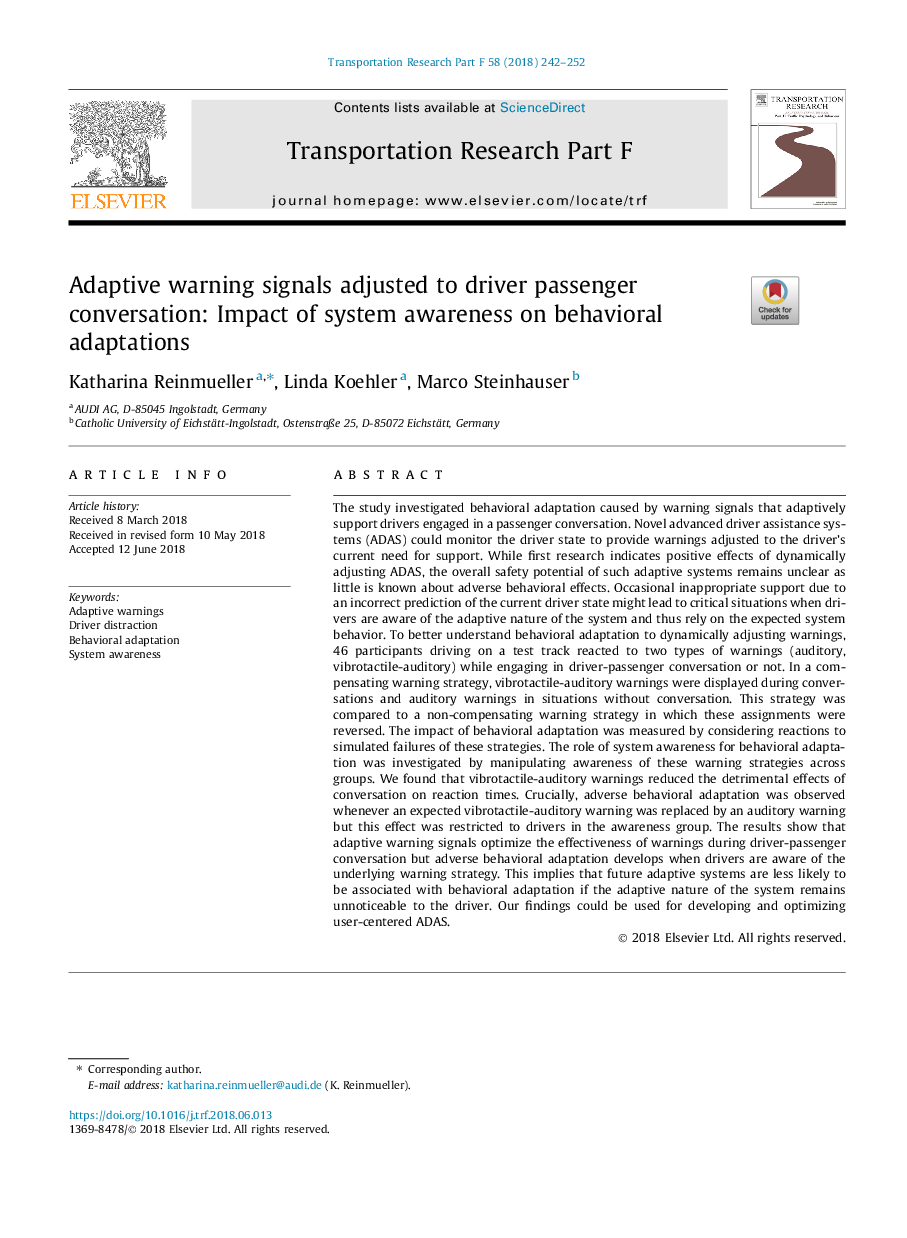| کد مقاله | کد نشریه | سال انتشار | مقاله انگلیسی | نسخه تمام متن |
|---|---|---|---|---|
| 7257531 | 1472429 | 2018 | 11 صفحه PDF | دانلود رایگان |
عنوان انگلیسی مقاله ISI
Adaptive warning signals adjusted to driver passenger conversation: Impact of system awareness on behavioral adaptations
ترجمه فارسی عنوان
سیگنال های هشدار دهنده سازگار برای گفتگو درایور راننده: تاثیر آگاهی سیستم در سازگاری رفتاری
دانلود مقاله + سفارش ترجمه
دانلود مقاله ISI انگلیسی
رایگان برای ایرانیان
کلمات کلیدی
هشدارهای سازگار، منحرف کننده راننده، سازگاری رفتاری، آگاهی سیستم،
موضوعات مرتبط
علوم انسانی و اجتماعی
روانشناسی
روان شناسی کاربردی
چکیده انگلیسی
The study investigated behavioral adaptation caused by warning signals that adaptively support drivers engaged in a passenger conversation. Novel advanced driver assistance systems (ADAS) could monitor the driver state to provide warnings adjusted to the driver's current need for support. While first research indicates positive effects of dynamically adjusting ADAS, the overall safety potential of such adaptive systems remains unclear as little is known about adverse behavioral effects. Occasional inappropriate support due to an incorrect prediction of the current driver state might lead to critical situations when drivers are aware of the adaptive nature of the system and thus rely on the expected system behavior. To better understand behavioral adaptation to dynamically adjusting warnings, 46 participants driving on a test track reacted to two types of warnings (auditory, vibrotactile-auditory) while engaging in driver-passenger conversation or not. In a compensating warning strategy, vibrotactile-auditory warnings were displayed during conversations and auditory warnings in situations without conversation. This strategy was compared to a non-compensating warning strategy in which these assignments were reversed. The impact of behavioral adaptation was measured by considering reactions to simulated failures of these strategies. The role of system awareness for behavioral adaptation was investigated by manipulating awareness of these warning strategies across groups. We found that vibrotactile-auditory warnings reduced the detrimental effects of conversation on reaction times. Crucially, adverse behavioral adaptation was observed whenever an expected vibrotactile-auditory warning was replaced by an auditory warning but this effect was restricted to drivers in the awareness group. The results show that adaptive warning signals optimize the effectiveness of warnings during driver-passenger conversation but adverse behavioral adaptation develops when drivers are aware of the underlying warning strategy. This implies that future adaptive systems are less likely to be associated with behavioral adaptation if the adaptive nature of the system remains unnoticeable to the driver. Our findings could be used for developing and optimizing user-centered ADAS.
ناشر
Database: Elsevier - ScienceDirect (ساینس دایرکت)
Journal: Transportation Research Part F: Traffic Psychology and Behaviour - Volume 58, October 2018, Pages 242-252
Journal: Transportation Research Part F: Traffic Psychology and Behaviour - Volume 58, October 2018, Pages 242-252
نویسندگان
Katharina Reinmueller, Linda Koehler, Marco Steinhauser,
